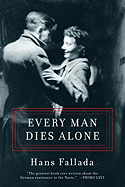

Otto and Anna are simple people. He is a master carpenter whose factory is now producing bomb crates for the war effort; she is a housewife and mother. The letter, which announces the death of their only son in battle, shatters their fragile reality and leaves them alone with each other. Just as Rainer Maria Fassbinder did in his films, Fallada's novel observes Otto and Anna in their grief with unnerving clarity: the reticent, parsimonious Otto withdraws and the long-suffering Anna spirals into feelings of hopelessness and abandonment. When Otto comes up with a scheme to create and distribute anonymous postcards to foment dissent against the Nazis, Otto and Anna begin to share a renewed purpose. The knowledge that they are on a dangerous course does not deter them. Their first postcard dropped in a deserted stairwell proclaims: "Mother! The Führer has murdered my son."
The Quangels hope that the postcard will be read and passed around so that others will rise up. Although they know that the Nazis will be looking for them, they press on with their subversive project. Fallada, who suffered at the hands of the Nazis himself, trains his cold, satirical eye on the Gestapo investigation of the Postcard War to astonishing effect. As he tells it, if the Gestapo weren't so deadly, they and their bumbling techniques would be darkly funny. Nobody, however, would find their interrogation methods funny: "they will ask you questions, one man will take over from another, but no one will take over from you, however exhausted you get. Then when you fall from exhaustion, they'll rouse you with kicks and blows, and they'll give you salt water to drink, and when none of that does any good, they will dislocate every bone in your hand one by one. They will pour acid on the soles of your feet."
We expect to find sadistic goons in the Gestapo, but Fallada presents the trial court for the Quangels with equal disdain. Germany had gone mad, one character explains, with half the country arresting the other half. Otto and Anna Quangel were only two of many arrested, tortured and executed during those years, but we come to know them intimately in Fallada's unblinking, brilliant report from a living Hell.--John McFarland
Shelf Talker: Fans of the novels of Alan Furst and Irene Némirovsky will love the gritty "you are there" feel of this harrowing saga of a German couple fighting for their dignity in the face of unrelenting Nazi oppression and sadism.

